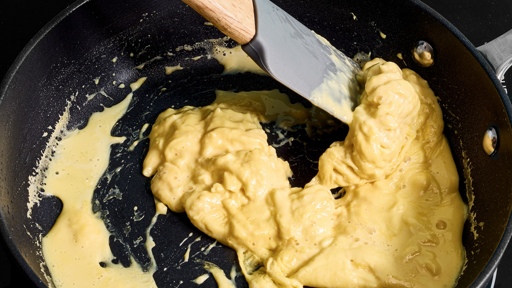Sometimes, Josh Tetrick will quiz strangers in the dairy aisle. He’ll strike up a conversation with a fellow grocery store patron and ask if they’ve heard about “this egg that’s made from plants?” He might point out the golden-yellow boxes shaped like milk cartons sitting on refrigerated shelves, not too far from the egg cartons. Generally, he finds that people don’t know what he’s talking about. “Most people will be like, ‘What?’”
The product Tetrick is referring to — which, not coincidentally, he manufactures — is called Just Egg. It’s a liquid vegan egg substitute made from mung beans, a member of the legume family, and it’s designed to scramble just like a real chicken egg when cooked over heat. (The company also sells frozen omelette-style patties that can be heated up in a toaster oven and frozen breakfast burritos.) Along with his best friend Josh Balk, Tetrick cofounded the company Eat Just, formerly known as Hampton Creek, which developed Just Egg over years of testing. On a recent call with Grist, Tetrick described the products — which are meant to look, taste, and cook like real eggs — as “definitely, definitely weird.”
Over the years, Tetrick’s company, which also houses the cultivated meat subsidiary Good Meat, has received criticism for allegedly exaggerating its environmental claims and sales figures. In 2016, Bloomberg Businessweek reported that the company — then called Hampton Creek — removed the climate benefits of its vegan mayonnaise product, Just Mayo, from its website after an external audit found they were inaccurate. Previously, Bloomberg reported that Hampton Creek had instructed contractors to buy back its vegan mayo from stores. Tetrick said that the buybacks were for quality assurance purposes only, but in 2016 both the Department of Justice and the Securities and Exchange Commission launched inquiries into the company for potentially inflating its sales numbers. The following year, both investigations were dropped.
Those in the plant-based industry say that once vegan alternatives taste as good as real meat and cost the same or less, then sales will go up. Entrepreneurs and advocates have focused on developing the technology, supply chains, and economies of scale needed to lower the price of animal-free protein products. But the current situation with vegan eggs suggests that change can also happen when the animal-based option becomes much more expensive. Prices vary from store to store and region to region, but on the online store for the Manhattan West location of Whole Foods, one 16-ounce carton of Just Egg, the equivalent of about 10 small eggs, costs $7.89. Meanwhile, a dozen eggs, depending on the brand, run from about $7 to up to $13.



You just gave me another reason not to buy into their marketing.
But then again, I’m probably not their target audience.
Eggs are too much of a hassle for me as the smell stick to the utensils (and then to the sponges I use to clean the utensils) and ruin the smell of non-egg things that I make later.
So the only time I am taking eggs is if I am in a condition where I cannot do the occasional fasting due to a bad environment.
I like mung as is and don’t need someone to ultraprocess it for me to desire it.
I am fine with sugar. Specially considering this is a naturally occurring one vs eating refined sugarcane.
The reason they refine the protein is not for health reasons or to avoid sugars, the reason is that the carbs in the mung beans cause the resultant mix to cook into a consistency more like pancakes than eggs. The protein isolated from mung beans (i.e. without the carbs), however, behaves a lot more like chicken eggs would naturally - it scrambles nicely and has a texture and quality like eggs.
So the reason to buy Just Egg instead of mung dal is mostly because it actually has a texture like eggs. (I’m not sure there is anything inherently wrong with isolating the protein from mung dal, when we make seitan that’s what we’re doing with wheat after all - “processed” is usually meaningless as to what we should think about it.)
If you’re flexible with your concept of eggs and are willing to eat that pancake texture, then mung dal works great - I still like to use it on occasion, esp. for a scrambled egg substitute for a breakfast (so I might do mung bean pancakes with hash browns and vegan sausage, for example).
The main reasons for me is that mung dal is shelf stable and much cheaper than Just Egg (and chicken eggs). I find it at Indian groceries, but you can also buy it online.